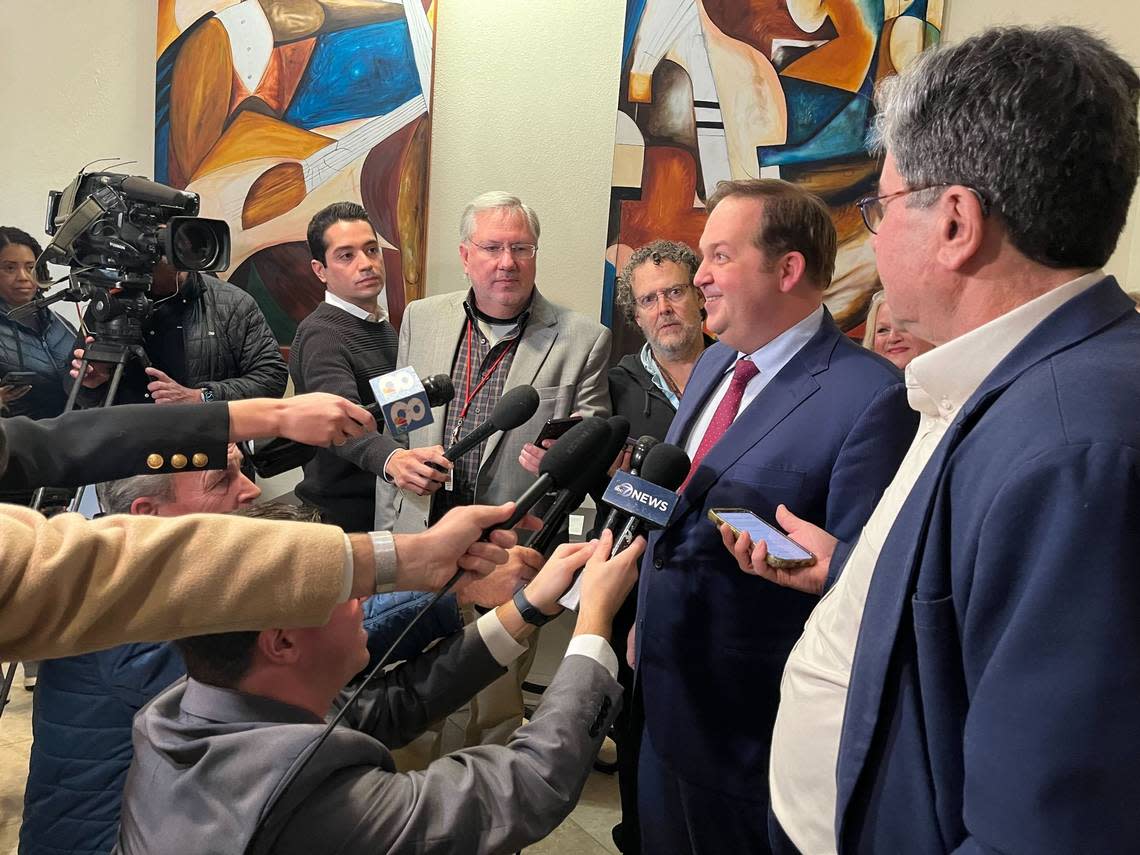Why Republicans aren’t talking about abortion at their convention

- Oops!Something went wrong.Please try again later.
Donning big, white pins that say “Life,” some delegates here at the Republican National Convention have practically worn on their sleeves the position that has for so long marked the party’s stance against abortion.
But otherwise, an event convened to once again hand the presidential nomination to Donald Trump has largely treated the issue as an unspoken part of the GOP platform — leaving the public fight to Republicans in states like Florida, where the matter is on the ballot, and Missouri, where it will likely go before voters this year.
“The Republican National Committee … is trying to appeal to swing voters who may or may not agree on that issue,” said Sydney Salatto, a delegate from Tampa who described an effort to enshrine abortion access in Florida’s constitution as “extreme.”
She said that in Milwaukee, the party “is trying to focus on things that affect all people, like the economy.”
While fierce opposition to abortion has been a policy staple of GOP conventions since 1980, this year speakers have barely mentioned it. There are virtually no signs visible promoting the anti-abortion cause, and almost none of the dozens of televised speeches have mentioned the issue.
Abortion was among the policies given short shrift in a pared-down, 16-page platform kept short at the advice of Trump’s advisers so that its material couldn’t be used “as a weapon” by Democrats. Trump, who lives in Florida, has said the federal government should stay out of the matter.
“It’s being decided where it should, on the state level,” Michelle Smith, an Orlando businesswoman, told McClatchy.
The stance — which ruffled some feathers when the platform was released — effectively cedes the campaign on abortion to Republicans in individual states, sparing Trump the burden of fighting over the particulars of abortion access, which polls suggest is supported by a majority of American voters.
In Florida, which recently restricted abortions after 6 weeks of pregnancy, that burden belongs to Gov. Ron DeSantis. The governor has promised to defeat a ballot question that would guarantee abortion up until the point of viability or in circumstances where the procedure is deemed to be medically necessary by a “healthcare provider.”
A proposal expected to be on the ballot in Missouri would do much the same.
RELATED CONTENT: In abortion rights vote, Missouri could do something no state has before
Republicans in both states have attacked the ballot questions as intentionally vague and misleading, claiming it would go beyond what was allowed by law before the Supreme Court overturned the doctrine established in 1973 by the decision in Roe vs Wade. ”There are so many holes in it,” such as vague limits on what the latest term is to terminate a pregnancy, warned Darlene Corezo Swaffer, of Deerfield Beach.
Democrats have hoped that demand for abortion access will drive turnout in battlegrounds, even in Florida, which Republicans predicted this week will vote for Trump for a third straight election, and by a wider margin than ever before.
“The first decision that Donald Trump had to do was choose a vice president. And he chose JD Vance, one of the most extreme individuals when it comes to abortion,” Florida Democratic Party Chairwoman Nikki Fried said during a Thursday press call. “He is the exact message for the Republican party at this moment.”
When Vance, a 39-year old U.S. senator from Ohio and Yale Law School graduate, first ran for his seat in 2022, his campaign website read: “End Abortion,” according to internet archives. He’s reportedly seeking to downplay his position now as Trump’s running mate.
Fried sought to tie Trump to Project 2025, a conservative manifesto by the Heritage Foundation that, in part, tasks the Food and Drug Administration with reversing approval of the commonly used abortion medication mifepristone. Trump has tried to distance himself from Project 2025, with his campaign saying he supports the party’s platform.
Mary Ziegler, a law professor and historian on the U.S. abortion debate, said that the platform sends mixed signals on abortion. It says the party opposes late-term abortions and supports access to birth control and in vitro fertilization fertility treatments, but she has argued that it also indicates that the U.S. Constitution recognizes fetal personhood after the fall of Roe v. Wade — two sets of potentially contradictory ideas.
But in Milwaukee, the abortion “issue is way down on the list,” said Laura Perry, a California attorney.
Matt Bingesser, an attorney from Kansas, where two years ago voters rejected a ballot question to ban abortion, said “people are focusing on issues that are more pertinent.”
“This election is about national security, public safety and returning our economy to where it’s working for everyone,” he said.
Florida GOP Chairman Evan Power said Republicans at the convention were focused on other issues, particularly after the assassination attempt on Trump. Abortion, he said, “is no big deal.”
Raleigh News & Observer Washington correspondent Danielle Battaglia contributed to this report.

